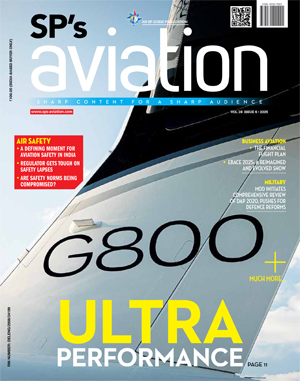INDIAN ARMED FORCES CHIEFS ON OUR RELENTLESS AND FOCUSED PUBLISHING EFFORTS

The insightful articles, inspiring narrations and analytical perspectives presented by the Editorial Team, establish an alluring connect with the reader. My compliments and best wishes to SP Guide Publications.

"Over the past 60 years, the growth of SP Guide Publications has mirrored the rising stature of Indian Navy. Its well-researched and informative magazines on Defence and Aerospace sector have served to shape an educated opinion of our military personnel, policy makers and the public alike. I wish SP's Publication team continued success, fair winds and following seas in all future endeavour!"

Since, its inception in 1964, SP Guide Publications has consistently demonstrated commitment to high-quality journalism in the aerospace and defence sectors, earning a well-deserved reputation as Asia's largest media house in this domain. I wish SP Guide Publications continued success in its pursuit of excellence.
- The layered Air Defence systems that worked superbly, the key element of Operation Sindoor
- Operation Sindoor | Day 2 DGMOs Briefing
- Operation Sindoor: Resolute yet Restrained
- India's Operation Sindoor Sends a Clear Message to Terror and the World – ‘ZERO TOLERANCE’
- Japan and India set forth a defence cooperation consultancy framework, talks on tank and jet engines
Quality Training is Paramount
Airlines must invest in quality training of their commercial pilots as it plays a vital role in charting a course of safety, excellence and success for the carrier

The aviation industry is one of the most complex and safety-critical sectors, where the expertise of pilots plays a paramount role in ensuring the safety and success of each flight. Every time a commercial flight takes-off, it is the Pilots and the crew onboard that are responsible for the safety and comfort of hundreds of passengers.
Commercial pilots face a myriad of challenges, including adverse weather conditions, technical malfunctions, air traffic congestion, and emergent situations. In this context, continuous and high-quality training is not only necessary but also indispensable for commercial pilots. Airlines must recognise the significance of investing in their training and operations, as it directly impacts the safety, efficiency, and reputation of their services.
SAFETY FIRST
The primary and non-negotiable objective of any airline is the safety of its passengers, crew, and aircraft. Commercial pilots are entrusted with the responsibility of the lives of hundreds of people on each flight. Regular and rigorous training equips them to handle a wide range of scenarios, including emergency situations and equipment failures, with composure and skill. By simulating real-life scenarios during training, pilots can develop muscle memory and quick decision-making abilities, both of which are crucial when split-second judgments are necessary in high-pressure situations.
STAY CURRENT WITH EVOLVING TECHNOLOGY
The aviation industry is continually evolving, with advancements in technology shaping the way aircraft are operated. Continuous training ensures that pilots remain up-to-date with the latest developments, including new avionics systems, navigational aids, communication protocols, and safety features. Familiarity with these technologies enhances a pilot’s ability to operate aircraft efficiently and effectively, minimising the likelihood of errors caused by unfamiliarity with modern equipment.
CRISIS MANAGEMENT AND DECISION-MAKING
Commercial Pilots are often faced with challenging situations that demand quick and informed decision-making. Continual training sharpens their ability to analyse complex situations and respond appropriately. Simulated exercises allow pilots to practice handling emergencies, abnormal situations, and rare events, which significantly improves their confidence and competence in making critical decisions.
ENHANCING CREW RESOURCE MANAGEMENT (CRM)
Continuous training in Crew Resource Management (CRM) fosters better collaboration among pilots, co-pilots, and flight attendants. It emphasises assertiveness, situational awareness, and leadership skills, enabling the crew to work cohesively and efficiently in challenging circumstances.
IMPROVING OPERATIONAL EFFICIENCY
Airlines invest substantial resources in training their pilots because it pays off in terms of operational efficiency. Well-trained pilots are more adept at optimising flight profiles, adhering to fuel-efficient procedures, and reducing maintenance costs by minimising wear and tear on aircraft components. Furthermore, proficient pilots are less likely to encounter incidents or accidents, leading to fewer disruptions to flight schedules and a better overall passenger experience.
ENHANCING CUSTOMER CONFIDENCE
For airlines, customer satisfaction and loyalty are crucial for sustained success. Passengers are more likely to choose an airline with a reputation for safety, reliability, and excellent service. Continuously trained pilots inspire confidence in passengers and provide reassurance that their well-being is a top priority for the airline.
REGULATORY COMPLIANCE
Civil aviation authorities around the world impose stringent training requirements on commercial pilots to maintain their licenses and certifications. Airlines must adhere to these regulations, and investing in continuous training helps pilots meet the necessary standards. Failure to comply with regulatory requirements can lead to severe penalties for airlines, including grounding of aircraft and reputational damage.
Continuous and high-quality training for commercial pilots is an indispensable investment for airlines. Safety, compliance with regulations, crisis management, efficient operations, and customer confidence are just some of the critical reasons why airlines should prioritise pilot training. The aviation industry’s dynamic nature underscores the necessity of ongoing training as an essential pillar of successful and responsible airline operations.
By ensuring that their pilots are well-prepared and equipped to handle any situation, airlines not only safeguard their reputation but also uphold their commitment to passenger safety and satisfaction.





